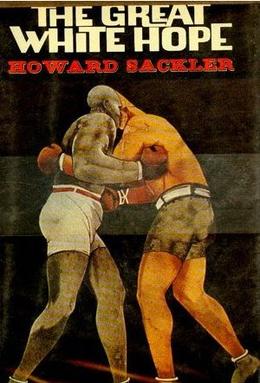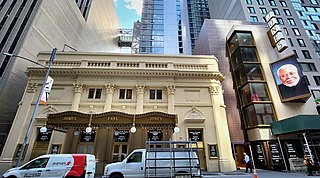Related Research Articles

The Great White Hope is a 1967 play written by Howard Sackler, later adapted in 1970 for a film of the same name.

Martin Patterson Hingle was an American character actor who appeared in stage productions and in hundreds of television shows and feature films. His first film was On the Waterfront in 1954. He often played tough authority figures. Hingle was a close friend of Clint Eastwood and appeared in the Eastwood films Hang 'em High, The Gauntlet, and Sudden Impact. He also portrayed Jim Gordon in the Batman film franchise from 1989 to 1997.

Sada Carolyn Thompson was an American stage, film, and television actress. She was known to television audiences as Kate Lawrence in Family (1976-1980), for which she won the Emmy Award for Outstanding Lead Actress in a Drama Series in 1978.

The Vivian Beaumont Theater is a Broadway theater in the Lincoln Center complex at 150 West 65th Street on the Upper West Side of Manhattan in New York City. Operated by the nonprofit Lincoln Center Theater (LCT), the Beaumont is the only Broadway theater outside the Theater District near Times Square. Named after heiress and actress Vivian Beaumont Allen, the theater was one of the last structures designed by modernist architect Eero Saarinen. The theater shares a building with the New York Public Library for the Performing Arts and contains two off-Broadway venues, the Mitzi E. Newhouse Theater and the Claire Tow Theater.

The James Earl Jones Theatre, originally the Cort Theatre, is a Broadway theater at 138 West 48th Street, between Seventh Avenue and Sixth Avenue, in the Theater District of Midtown Manhattan in New York City, United States. It was built in 1912 and designed by architect Thomas W. Lamb for impresario John Cort. An annex to the west of the theater, built between 2021 and 2022, was designed by Kostow Greenwood Architects. The Jones has 1,092 seats across three levels and is operated by the Shubert Organization. Both the facade and interior of the theater are New York City designated landmarks.
Robert Marasco was an American horror novelist, playwright, and teacher. He is best known for his 1970 Broadway play Child's Play, and his supernatural novel Burnt Offerings (1973), which was adapted into a 1976 film of the same name.
George M! is a Broadway musical based on the life of George M. Cohan, the biggest Broadway star of his day who was known as "The Man Who Owned Broadway." The book for the musical was written by Michael Stewart, John Pascal, and Francine Pascal. Music and lyrics were by George M. Cohan himself, with revisions for the musical by Cohan's daughter, Mary Cohan.
Edwin Sherin was an American director and producer. He is best known as the director and executive producer of the NBC drama series Law & Order (1991–2005).
Henry, Sweet Henry is a musical with a book by Nunnally Johnson and music and lyrics by Bob Merrill.

Here's Where I Belong is a musical with a book by Alex Gordon and Terrence McNally, lyrics by Alfred Uhry, and music by Robert Waldman. The musical closed after one performance on Broadway.

Wise Child is a 1967 play by English playwright Simon Gray.

The Season: A Candid Look at Broadway is an account of the 1967–1968 season on and off-Broadway by American novelist and screenwriter William Goldman. It originally was published in 1969 and is considered one of the better books ever written on American theater. In The New York Times, Christopher Lehmann-Haupt called the book “Very nearly perfect...It is a loose-limbed, gossipy, insider, savvy, nuts-and-bolts report on the annual search for the winning numbers that is now big-time American commercial theatre.”
What Did We Do Wrong? is a comedy play about a businessman who turns hippie. The original Broadway production starred Paul Ford and cost $75,000. It only had a short run.
The Ninety Day Mistress is a 1967 sex comedy play. The original production starred Walter Abel, Martin Milner and Dyan Cannon and ran for 24 performances.
Mike Downstairs is a 1968 American play. It was poorly reviewed and had a short run on its Broadway debut despite starring Dane Clark.
After the Rain is a play by John Griffith Bowen, based on his 1958 novel about a 200-year flood. The action takes place in a university lecture hall two centuries after a massive rainfall.
A Minor Adjustment is a 1967 play. It was written by Eric Nicol, a Canadian humorist. The play was originally titled Like Father, Like Fun and realised to audiences in 1966 in Vancouver.
By George is a 1967 play about George Bernard Shaw based on his writings.
Paris Is Out! is a 1970 Broadway comedy by Richard Seff that starred Sam Levene and Molly Picon as Daniel and Hortense Brand, a married couple planning a vacation. The Broadway production ran for 96 performances after 16 previews at the Brooks Atkinson Theatre between February 2 and April 18, 1970.

Red, White and Maddox is a satirical musical revue written by Jay Broad and Don Tucker. The play debuted in Atlanta in October 1968 and later had a 41-performance run on Broadway from January 26 to March 1, 1969. The play was conceived by Broad, who at the time was the director of the Theatre Atlanta theatrical company. Modeled as a fictional biography of Georgia Governor Lester Maddox, the play is split into two acts. The first act chronicles Maddox's foray into politics as a firebrand segregationist, culminating in him becoming governor of the state. The second act, set in the future, details Maddox becoming president of the United States.
References
- Brown, Dennis. Shoptalk: Conversations About Theater and Film with Twelve Writers, One Producer–and Tennessee Williams' Mother (1992), Newmarket Press, ISBN 1-55704-128-8
- Goldman, William. The Season: A Candid Look at Broadway, (1969), Hal Leonard Corporation, ISBN 0-87910-023-0 (1969)
- Jacobs, Susan. On Stage: The Making of a Broadway Play (1967) Alfred A. Knopf
- Stasio, Marilyn. Broadway's Beautiful Losers (1973, ©1972), New York, Dell